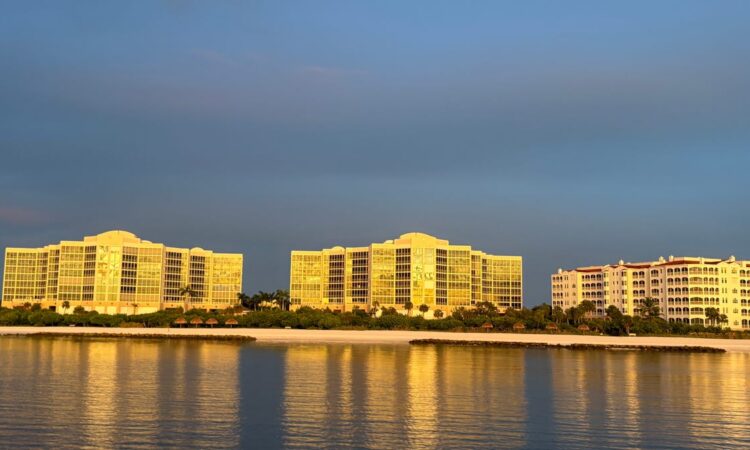

S.S. Jolley Bridge in Collier County captured on drone video
Cruise along the S.S. Jolley Bridge in Marco Island
- The Marco Island City Council approved a property tax rate of 1.267 mill for the 2026 fiscal year.
- This new rate marks an end to eight years of property tax rollbacks for the city.
- An earlier proposal for a much larger 34% tax increase was scrapped after an accounting error was discovered.
Although its chairman was absent, the Marco Island City Council managed – with some dispute – to approve a property tax rate and corresponding budget for Fiscal Year 2026, which begins Oct. 1.
With a final vote of 4-2, the city council Sept. 22, 2025, approved a property tax, or millage, rate of 1.267 mill for FY26, up 2.18% from 1.2400 for FY25. Councilors in July had considered a 34% increase to1.6680 mill.
One mill equates to $1 for every $1,000 worth of a property’s assessed, or taxable, value (after adjustments, such as the homestead exemption for residents). Taxes on a $1 million property will be $1,267, up $27 from $1,240 this year.
The council had tie votes to keep the rate at 1.2400 and to raise it to 1.267 without any alterations to the budget. The final vote moved $430,000 that was intended to replace a beach boardwalk at Winterberry Drive and Collier Boulevard to reserves for discussion later by the full seven-member council.
Councilors Stephen Gray, Tamara Goehler voted against the 1.267 mill rate but for the 1.2400 rate. Councilors Darrin Palumbo, Rene Champagne, Deb Henry and Bonita Schwan voted in favor. Chairman Erik Brechnitz was absent. City Manager Mike McNees said Brechnitz “was unable to attend the meeting.” A text to Brechnitz Tuesday morning wasn’t returned.
Ending 8 years of property tax rate rollbacks
After eight years of property tax rollbacks, Marco Island was looking to cover increased staffing costs and dig out of the hole that staff and council say has been created and left city assets in disrepair. With increasing property values, mostly from new construction, over the past decade, Marco Island’s city councils focused on lowering property tax rates for most property owners, while maintaining the same revenue for the city – known as rollback. Staff during those years were instructed to create a budget with rollback tax rates, said Assistant City Manager Casey Lucius.
The city also is trying to make up for the loss of the 1-cent tax for capital projects that Collier County chose not to ask voters to continue. The tax had been in place since November 2018 and provided about $26 million to Marco Island during that time. It expired at the end of calendar year 2023.
A majority of councilors, including Goehler, seemed to be on board for the 34% increase in early August, based on months of budget workshops and talks of the city’s infrastructure improvement needs. But after city staff discovered an accounting mistake in the budget, the recommended millage rate and budget had to be cut. Staff then recommended a 1.4611 mill rate. Councilors told staff to cut more from the budget and on Sept. 8, considered the lower options of 1.267 mill or keeping the rate the same as FY25, at 1.2400.
After eight years of property tax rollbacks, Marco Island was looking to cover increased staffing costs and dig out of the hole that staff and council say has been created and left city assets in disrepair. With increasing property values, mostly from new construction, over the past decade, Marco Island’s city councils focused on lowering property tax rates for most property owners, while maintaining the same revenue for the city – known as rollback. Staff during those years were instructed to create a budget with rollback tax rates, said Assistant City Manager Casey Lucius.
The city also is trying to make up for the loss of the 1-cent tax for capital projects that Collier County chose not to ask voters to continue. The tax had been in place since November 2018 and provided about $26 million to Marco Island during that time. It expired at the end of calendar year 2023.
Staff members found that the formula and factors used to calculate allowed spending by Marco Island as laid out in the city charter contained an error. The information had been used during budget planning workshops since April while then finance director Guillermo “Gil” Polanco was in charge. Polanco resigned a day after disagreeing with Brechnitz about results of the annual financial audit.
The city has hired a new finance director – Carol A. McDermitt – who will start Oct. 14, McNees said. McDermitt most recently was senior vice president finance support officer of the Federal Reserve Bank of Boston, according to a resume McNees provided to the Naples Daily News.
The city’s total taxable value of real and personal property – as calculated by Collier County – is $18.5 billion, up from this year’s $17.1 billion. According to Zillow, the current average home price on Marco Island is $837,850, down 6.3% from this time last year.
What about Hideaway Beach?
Those who live in Hideaway Beach in Marco Island will pay more, as they always have because they are in a special tax district. The approved FY26 rate is 1.6000, the same as in FY25.
Residents of the private beach community pay a special district property tax on top of the Marco Island tax. Total taxable value for the coming year is $954.3 million, up from $873.2 million in FY25. The community of about 300 acres includes single-family homes, condos, villas and cottages. About half the acreage is wetlands and conserved lands.
The taxing district is a dependent special district of the City of Marco Island that was “created to improve, renourish, preserve, maintain and monitor the beach property located within the boundaries of Hideaway Beach.”




